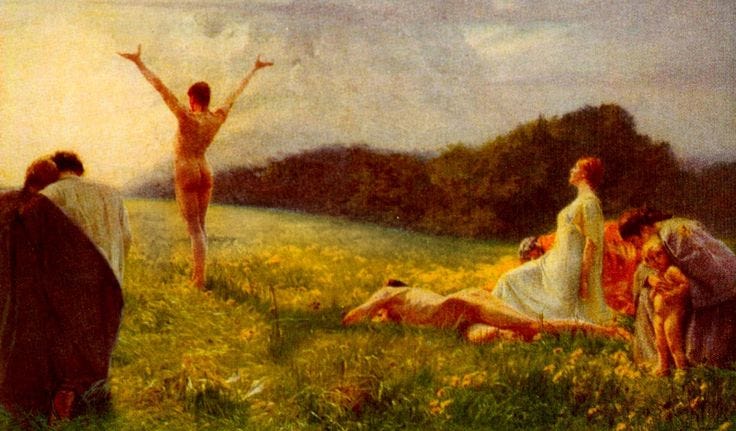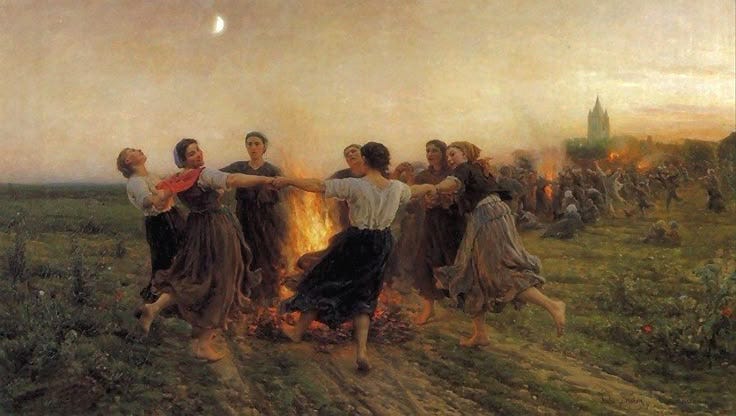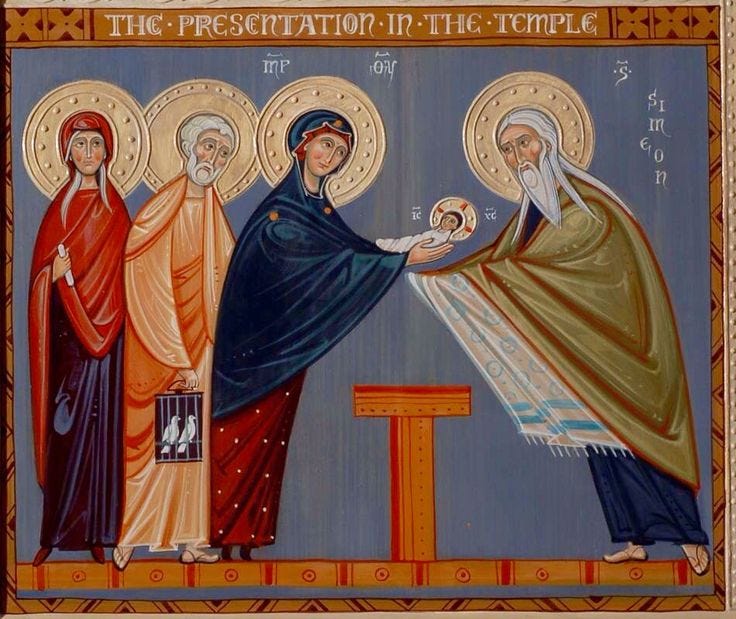The Christmas season has come and gone again. It was a particularly special one for me. My daughter was born on the 10th day of Christmas. My wife’s pregnancy beginning when it did, this Advent took on a special significance, as we experienced a little Advent of our own during the fast. Seeing my wife over the course of those last few weeks and in labor opened up a whole new world of insights into the Nativity story that I don’t think I could have conceived of before.
The alignment of my own life with the church calendar in such a symbolic way got me thinking again about the cycles of the world and our relationship to them. Or rather, our modern lack of any such relationship. In Western society the solstices and equinoxes pass by with hardly a mention and our holidays are marked mostly by consumerism. We are not exactly living in harmony with the earth and the cosmos, and the deeper meaning of the Church calendar is being lost.
There are so many ways in which our disenchantment is due to a lost connection with the natural world, but today I want to talk about seasons, and calendars. A combination of the solar year and the church calendar that I’ll call the “sacred year”. Industrialization has disenchanted us much in our day to day lives. Social media, unnatural lighting, nutrient deficiencies, email jobs, and a whole host of other things are damaging us. Much of this I will leave for another time, although it is all certainly connected to this concept of the “sacred year”. I chose this topic as an early installment because our disenchantment with the greater cycles of life must be understood before we attempt to get into the weeds.
There is a natural pattern of rising and falling, waning and waxing, light and dark, life and death that permeates every aspect of creation. This is perhaps most clearly seen in the cycles of the natural world, the seasons. The sun strengthens in the summer and fades in the winter, the plants are born and die in a natural rhythm. Animals follow the pattern and mate, hibernate, and migrate in tune with these cycles. And until industrialization, men were a part of this as well. Humans used to live in alignment with the cycles of the year, out of necessity of course, but also more than that. I think it would be more accurate to say we follow it out of instinct. Does the bear hibernate out of necessity, or instinct? Do birds migrate out of necessity, or instinct? Put that way, the question is absurd, or just pointless. Human beings throughout history lived in concord with the cycles of the world around them simply because we are part of the world. We planted when it was time to plant, and harvested when the earth was ready. We bunkered down in winter and made babies in spring. It is only now that we have managed to “escape” the confines of these cycles.
Did our “escape” bring about any good? It would be dishonest to say no. Industrial society has brought about wonders in medicine, communication, travel, research, standards of living. But in cutting out almost all the inconvenience that agricultural life entailed, did we cut out something vital from our lives? All too often, we fail to understand the subtle complexities of the world. We humans do not exist in a vacuum, we exist as part of the natural world. And it is inevitable that in our “escape” we left something precious behind. A piece of our humanity, traded for comforts and progress.
But we have not only lost our connection to the seasonal or agricultural cycles. The West has also forgotten what for two thousand years defined societal cohesion- the Church calendar. The Church calendar, far from an arbitrary series of feasts and fasts, is based on the agricultural/natural calendar, and in fact sanctifies it, making the world even more “natural” in the process.
Inevitably, this subject will see certain people (usually Americans unfortunately though understandably) come out of the woodworks to tell us that the Church calendar following these cycles is “pagan”. I won’t spend much time on this, as it is simply ridiculous. I am uncertain exactly what these types would have us do. Should we not follow the patterns that God built into the cosmos? Should we not celebrate the birth of Christ at the winter solstice, when the year itself is reborn? If Christ is truly the Son of God as many of these types do profess to believe- what other day of the year could you even expect Him to arrive? The entire life of Christ follows the sacred year cycle, or the journey of the Sun. How this could be seen as a negative thing or a “gotcha” I can’t fathom. But enough about this. The Church fathers did not place our feasts on the special days of the year as a “concession” to pagans, they placed them there because those days are just inherently special. The Church calendar follows the natural sacred year and this is a good thing and an intentional thing.
Christmas comes on the winter solstice. All Hallows’ Eve and All Saints’ Day, the feast where we commemorate the dead, comes on the day between the Fall equinox and the Winter solstice, known by many cultures as a day of the dead. Easter comes on (in theory) the spring equinox when life springs forth, although the actual date is a bit convoluted. The feast of the Ascension of Christ, though it falls a bit early, is the equivalent of the Summer solstice. The church calendar gives us a way to relate our faith to the natural world in a cohesive and tangible way. When the entire calendar was observed, it grounded us. Just imagine celebrating the Nativity in midsummer, or Easter on the Fall equinox. It would be unnatural. But the West hasn’t changed the calendar, it has just stopped using it altogether. We still celebrate Christmas and Easter, but barely. When’s the last time you celebrated all twelve days of Christmas?
In abandoning the church calendar, in abandoning an agricultural life, a life defined by natural cycles, what has happened to us? It seems this modern life has made us into synthetic creatures. It has jarred our very conception of time, one month is now hardly different from the rest beyond the decor we put up. In no longer following a seasonal lifestyle, we are left to float about aimlessly. As anyone can see, we do not do well without structure, either within a single day or across a year or a lifetime. Without structure we are all left to wallow in whatever our natural tendency is. Some may wallow in continual hedonism, others in continual contemplation, others in depression. Without the fasts and feasts of the Church year, we cannot truly learn how to do either. Without a time and place for everything, how could one ever live an enchanted life?
Without seasons, there is no energy, no magic. If there is no cycle, you are stuck in stasis. The seasons have lost their luster and so have we. Our lives have lost a natural “flow” that is likely more essential than we realize. Even our social lives reflect this. Human social calendars are meant to follow a seasonal pattern. You should have periods of fasting like Great Lent, cozy Christmas parties in winter, festivals on May Day and Midsummer. A time and a place for everything. Without a reason for celebration, you end up with a culture that is constantly “partying” but not truly feasting. Can we truly call a time like Christmas “magical” if we are glutting ourselves on everything we desire the entire year? Does Spring lose its meaning if we never allow ourselves to experience symbolic death in the darker parts of the sacred year? Without the crucifixion, there is no Resurrection.
Perhaps to begin to re-enchant ourselves, we need place ourselves back into the natural cycle of the cosmos that God created. We can in fact do this quite easily, especially my Christian readers. The church calendar is already there, ready to be followed. You don’t have to “feel” any special resonance with it right away. You can “fake it to you make it” as they say- over time, it will change you. We can also try our best, in our industrialized lives, to observe the seasons of the natural world around us. Do things in their appropriate season. Participate as best you can in local folk customs and traditions. Go to farmer’s markets and eat what’s in season. You don’t have to become a farmer yourself, but get in touch with the Earth as you can. Read your children stories of Sigurd and Galahad by the fire during Yuletide. If we can find our place again in the sacred year, I think we will be one step closer to defeating our disenchantment. If we fully participate in the life and death of the world in the seasons, and in the life and death of Christ in the church calendar, perhaps we will begin to understand how we should live in our own short sojourn on this Earth.
Fittingly, I’m posting this essay on February 2nd- Groundhog Day. It’s true name is Candlemas, the feast of the presentation of Christ at the temple. On this day candles are traditionally blessed and distributed for use throughout the year. This feast falls on the day of the year right between the Winter solstice and the Spring equinox, and this is no accident. Symbolically, it represents the first public appearance of the light that began to grow at the solstice, but was then a “secret”. It is the day where we have our first dream of Spring, both spiritually and materially. Things begin to seem a little brighter. And I think we are literally experiencing this right now in sync with the church calendar, especially in America. I don’t know if we will truly see a golden age, but there is a new feeling of hope in the air. But whatever the future holds, re-enchanting the world will have to start with you. Remember that you are a part of this world and bound to its rises and its falls. I wish you all a blessed Candlemas.









Congratulations on the birth of your daughter!
Regarding our 'lost connection to the natural world', I feel that's partly due to people getting outside less often. I know for me, I fail to get outside when it's really cold or really hot (I live in Texas). I want to hibernate in winter, and in the summer, when it moves too far above 100 degrees, I tend to stay inside. Really, both extremes are tolerable. I guess the point I'm trying to make is that getting out and experiencing the seasons might help us be more conscious of the passage of time, help restore our connection to the natural world, and maybe lessen the sensation that life goes by too quickly.
The FishEaters website's "Being Catholic" section is good for this sort of thing: http://www.fisheaters.com/beingcatholic.html At the top right are an explanation of "church time" (the liturgical year) and a link to another section with individual pages on all the different feasts and how to celebrate them in the traditional way (the site uses the 1962 liturgical calendar, so includes Ember Days and Rogation Days, etc.)